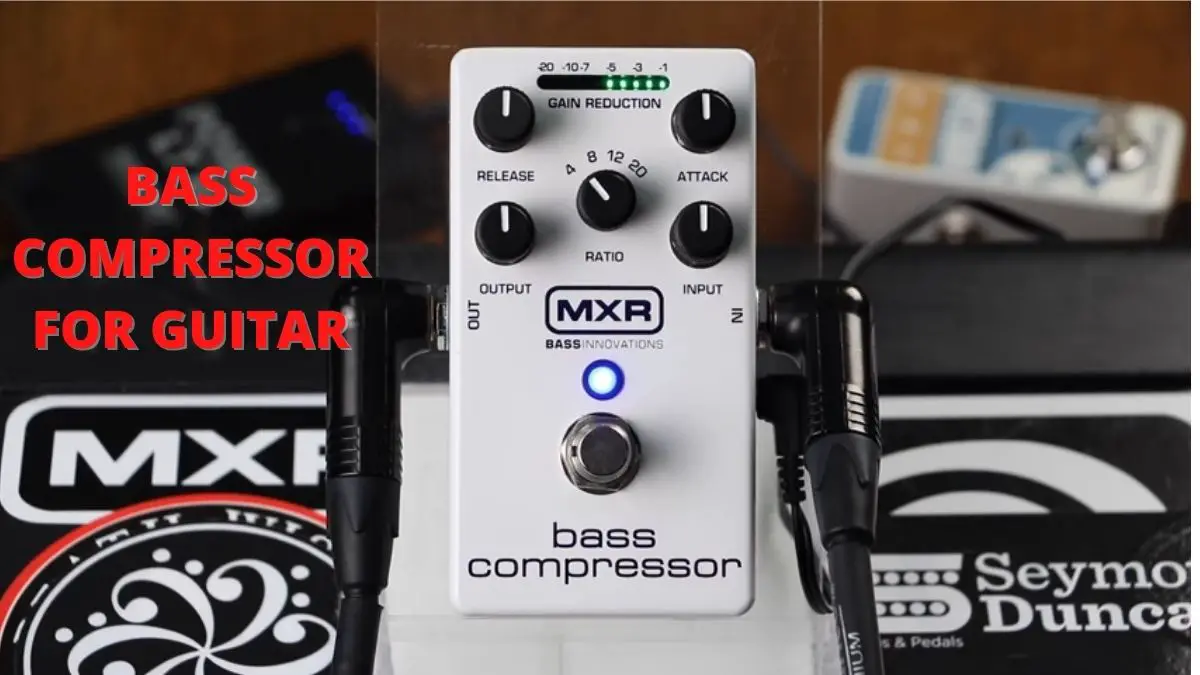A bass compressor is a tool that is typically used to “even out” the sound of a bass guitar by reducing the dynamic range of the signal. However, can it be used for a guitar? The answer is yes.
Guitar signals are usually even less compressed than bass signals, which means that a compressor can be used more effectively on guitar than bass. The main reason is the low-mid “boominess” of the guitar.
One can use this effect to add a bit more punch and thickness to your sound. This can also be used to remove the low-mids from other instruments, like a vocalist or saxophonist. That way you can use less compression on the other instruments.
In fact, many guitar players do use a bass compressor, especially those who play lead or solo guitar. Before understanding how to use a bass compressor for guitar, let us understand what is a bass compressor and how does it work?
What are a bass compressor and its functioning?
When it comes to music, there are a variety of instruments that make up the sound. Among these instruments is the bass.
The bass is one of the most important instruments in a band or musical group because it provides the low-end sounds that give the music its depth and fullness. In order to get the most out of a bass, musicians use a bass compressor.
Further, a bass compressor is an electronic device that is typically used to control the dynamic range of a signal by reducing the level of the louder sounds and boosting the level of the softer sounds.
This makes it easier to mix multiple signals together by evening out the levels, which can be important when you are trying to create a professional-sounding mix.
Bass compressors can be used on any type of audio signal, but they are especially popular for use with bass guitars and other low-frequency instruments. It is a great tool for bass players because it can help them to be heard more clearly in a mix.
A compressor works by detecting the level of the input signal and then applying a fixed amount of compression to it.
Can you use a compressor when recording guitar?
Compressors are a type of audio effect that is used to control the dynamics of an audio signal. This can be done by attenuating the peaks of the signal or by raising the level of the quieter parts of the signal.
Compressors are often used in recording because they can help to make a recording sound more consistent from beginning to end.
Thus, compressors can also be used when recording guitar. In fact, many engineers consider compression an essential tool for recording electric guitar. A compressor can help you achieve the right tone and dynamics for your track. It can also help to control feedback and keep your signal consistent.
Compressors help to achieve a consistent sound by evening out the dynamics of the performance. This makes it easier to balance the levels of different instruments in the mix and achieve a more polished sound.
They can also add warmth and richness to a guitar track, making it sound more like a real instrument. In addition, they can be used to create special effects, such as sustain or compression.
Factors to consider when recording guitar with compressor
When recording guitar with a compressor, there are a few factors to consider. If you are recording guitar with a compressor, and need to boost the signal level during certain parts of the song, it is important to consider how this will affect other instruments.
- Type of compressor– The type of compressor you choose depends on the sound you want to achieve. A compressor can add sustain and coloration, or it can be used as a dynamics control. There are optical and solid-state compressors, and each has its own sound. Optical compressors are warmer sounding and can add some nice sustain to your guitar track. Solid-state compressors are harsher sounding but can be used to achieve more aggressive sounds.
- Attack time– This is an essential factor to consider as the attack time will give you the best content of your dynamics. You need to make sure that the attack time is fast enough that it doesn’t affect the tone of the guitar. The release time- You also need to make sure that the release time is fast enough so that the attack isn’t too long.
- Ratio– The ratio of your compressor really affects how much it controls the dynamics. Thus, make sure that the threshold and ratio are set correctly so that the compressor doesn’t start distorting the signal.
- High-pass filter– this is optional but if you have a very harsh sounding compressor, it may sound better with a high pass filter. Just remember that the compressor is supposed to control your dynamics so don’t overdo it with this.
- Rrelease time– This is the amount of time it takes for the compressor to start to let go of the sound, and you want it to be fast enough that it doesn’t affect the tone of your guitar. The release time must also be minutely considered as it defines the natural sounds you play.
Further, you need to decide how much compression you want to use. Too much compression can make your guitar sound unnatural, while too little compression can make it sound weak. By experimenting with different compressor settings, you can find the right balance for your song.
Conclusion
Bass compressors can be used for guitar with some caveats. A bass compressor can be used to achieve a thicker, more consistent tone when playing rhythm guitar parts. It can also be used to add sustain to your notes.
They can provide a more even sound and help to control feedback, but they can also muddy the tone and reduce sustain. If you’re looking for a compressor to use specifically with guitar, it’s best to try out a few different models before making a purchase.


